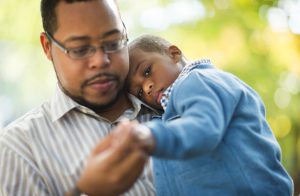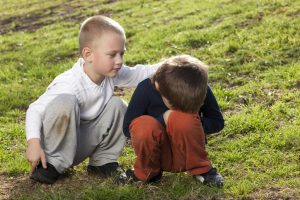
Understanding Children’s Unique
Reactions to Grief
Children grieve, but their reactions are different from adults. Often they experience grief in small amounts and for brief periods of time. They may be sad or crying one minute and happily playing the next. Children have short attention spans and are easily distracted from grief episodes. They can become emotionally overwhelmed with extensive periods of grief so they tend to “dose” themselves with small amounts of grieving at a time.

 Children in this age range see death as a temporary, reversible condition — similar to sleeping. They believe that a person can be dead for a while, but then come back to life. They do not understand the permanence of death.
Children in this age range see death as a temporary, reversible condition — similar to sleeping. They believe that a person can be dead for a while, but then come back to life. They do not understand the permanence of death. Children in this age group are beginning to recognize death as final and permanent. They are starting to have the ability to mourn and understand mourning. They may have a lot of questions and want details about the death. They may be concerned with how others are responding and whether they are reacting the right way.
Children in this age group are beginning to recognize death as final and permanent. They are starting to have the ability to mourn and understand mourning. They may have a lot of questions and want details about the death. They may be concerned with how others are responding and whether they are reacting the right way. The teen years can bring complex reactions to death. Some teens act as if they are not affected at all. Some accept logically that the death happened, but then pretend that it didn’t.
The teen years can bring complex reactions to death. Some teens act as if they are not affected at all. Some accept logically that the death happened, but then pretend that it didn’t.